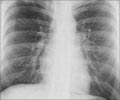- Tuberculosis caused by bacteria affect lungs and other organs in the body.
- Administering drug via the lungs vs oral administration shows new hope in the treatment of tuberculosis.
- Pyrazinoic acid that has been repurposed to deliver the drug into the lungs was found to show promising results.
The research study also found the new treatment to be beneficial in reducing toxicity to the body and other organs.
Pyrazinamide (PZA) , a first line agent for tuberculosis treatment was administered orally. It was found to act as a prodrug which gets converted into the active moiety pyrazinoic acid (POA) by microbial enzymatic action.
Pyrazinamide resistance occurs due to the mutation of the enzyme which is responsible for converting pyrazinamide to pyrazinoic acid.
Oral pyrazinoic acid is not effective for treatment and delivering pyrazinoic acid along with its non hydrolysable ester, n-propyl POA (PAE) can provide mitigating resistance for the active moiety.
Phillip Durham, biochemist at RTI International in Raleigh - Durham, N.C. said, "When it comes to TB therapy, there have not been a lot of new drugs introduced to market during the past two decades, and progress is slow despite enormous effort in new drug discovery."
The research study also demonstrated that aerosol administration to the lungs were effective when compared to high dose of oral pyrazinamide in the spleen.
Oral pyrazinamide drug was found to produce toxic side effects, reducing the dose while producing same efficacy levels to help patients.
The author says, "For drugs that are not orally bioavailable, the alternative is often injection," "Given the dose required, daily therapy, and the physical health of the patients, inhaled therapy has the potential to be far less painful, does not generate biohazardous waste like HIV contaminated needles (HIV/TB coinfection is a problem), and does not need to be kept cold, which is required by many injectables."
Source-Medindia













